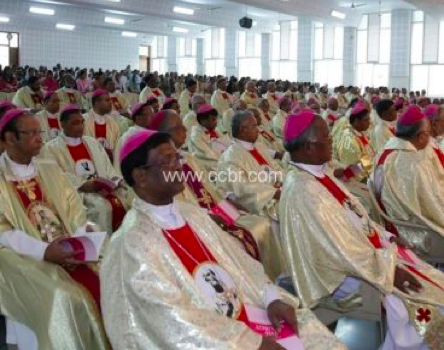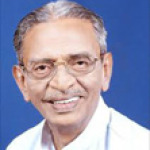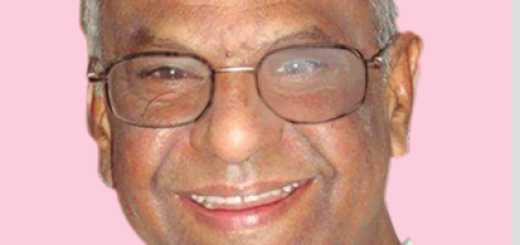Latin-rite bishops to seek ways to revitalize families

Latin Bishops’ Meet in Bhopal, MP – Published on: January 24, 2017 by: mattersindia.com
 (Note: For the benefit of our global audience and readership, it must be said that the Catholic Church in India is made up of a Trinity of Churches: Latin Church (Catholic Conference of Bishops in India), Syromalabar Church and Syro Malankara Church. These Churches have their annual meetings. Some publicize them, some don’t.
(Note: For the benefit of our global audience and readership, it must be said that the Catholic Church in India is made up of a Trinity of Churches: Latin Church (Catholic Conference of Bishops in India), Syromalabar Church and Syro Malankara Church. These Churches have their annual meetings. Some publicize them, some don’t.
The Syromalabar Church, the oldest, from 52 AD with the arrival of St.Thomas, with a strength of about 30 bishops had their 2017 general body meeting(Synod) at Kakkanad, this January 20th on wards; the Latin Church with the arrival St.Francis and the Portughese, the biggest of the three with a strength of 132 dioceses in India. Of them 130 bishops are attending the Bhopal Meet, Mathaya Pradesh now. The Syromalankara is the smallest of the group with around 15 bishops.
The Conference of the whole church in India called CBCI(Catholic Bishop’s Conference of India) meets only once in two years. For better understanding CBCI is the Catholic religious counterpart of the Secular government of India under the leadership of the BJP party with big or small skeleton parties like Siva sena, NCP etc. In the CBCI the major leading party or Church is the Latin Church with 132 dioceses and bishops, the second in the coalition is the Syromalabar with some 35 dioceses and the third Syromalankara with some 15 dioces, also called the skeleton party
The two minor Churches in the CBCI (Syromalabar and Malankara) were totally confined geographically to Kerala State for a very long time. For the last ten years they have been making herculean efforts for geographical expansion in India and abroad spearheaded more by Rite-based bishops. This is criticised by laity and outsiders since the stress and main aim here is the promotion of each particular Rite and territorial expansion not the spreading of the good news of Jesus.
Good news to the whole world is the globalized vision of Jesus. Spreading or strengthening one’s own Rite is comparable to Brexit and building a Mexican wall by Trump. So the Rite expansion is also called, religious colonization spreading northward from Kerala in India and abroad to USA, Canada, Australia, UK, since their main aim is to spread their Rite with the creation of as many bishops as possible. A political party’s strength is judged by the number of MPs or MLAs it has. Even so a Church(or Rite) is judged by the number of bishops and dioceses it rules.
For the sake of wielding a united Christian influence these Rites stay together and work together under the common name CBCI representing the entire catholics of India. For the sake of promoting their particular Rites, promotion of their particular spirituality through the creation of more bishops and dioceses they work separately, often creating inter-Rite frictions and rivalries, as there are interparty frictions in a coalition government in India.
Cardinals Telesphore Toppo of Ranchi and Oswald Gracias of Bombay are heads in different capacities of the Latin Church, Cardinal George Alancherry of Ernakiulam of Syromalabar church and Baselius Mar Cleemis of Trivandrum of Syromalankara Church.
We have combined below two reports of Bhopal meet of Jan.24th and Feb.1st from Matters India run by Jose Kaviyil. The meeting will conclude only on Feb.8th. What is important is to give wide publicity to the findings of the meeting of 130 bishops, religious and laity. It is not clear how many from lay people are taking part in the meeting and if they are nominated people from each diocese or elected representatives from each diocese.
Only to the extend they are elected representatives, the annual meeting at Bhopal will be a reflection of the thinking of the Latin Church in India. Why? Because everybody knows even today most of the dioceses do not have a Pastoral committee, or a Financial committed ordered by the Vatican council. Most of them are run by the dictatorial whims and fancies of the local bishops without any say from the thinking sections of the laity. So what will be produced by the Bhopal meet will be only the views of the clerical class who make up the 1% of the people of God, and not thee bulk of Church. What comes out from the Bhopal will be presented as the view of the whole church but in fact it will be only the views of the clerical class who will publicize plans and programs best suited for their happy survival. Let the laity who is presented as those fighting in the front lines of the Church, please take note. james kottoor, editor)
The Conference of Catholic Bishops of India (CCBI) is the national body for 182 bishops and 132 of the 171 dioceses in India. It is the largest bishops’ conference in Asia and the fourth largest in the world.
The conference is holding its 29th plenary assembly at the Pastoral Centre, Ashaniketan Campus, Bhopal, capital of the central Indian state of Madhya Pradesh.
The January 31-February 8 assembly has chosen the theme “Promoting the Joy of Love in Our Families.” The meet is expected to chalk out programs and plans to revive family apostolate at diocesan and parish levels, says a press release issued from the conference’s headquarters in Bengaluru, southern India.
Cardinal Oswald Gracias, president of the conference, will lead the inaugural Mass and preside over the opening meet on January 31.
Cardinal Lorenzo Baldisseri, secretary general of the Synod of Bishops based in Rome, is among the dignitaries attending the assembly, says the press note signed by CCBI deputy secretary general Father Stephen Alathara.
Bishop Lawrence Pius Dorairaj of Dharmapuri, chairperson of the CCBI Commission for Family, Donald and Maureen Xavier from Hyderabad; P. A. Edwin and Nimmy Marteena from Chennai; Colin Camiano from Bangalore; Elias and Catherine Lyngdoh from Shillong; Ishwar and Penny Bajaj from Mumbai; Biju Cheriyath from Bangalore; Patrick and Christina Ganawa from Jhabua; Joseph and Assunta Minj from Bhopal and Fr. Jomy Jacob from Jabalpur diocese will address the bishops on various aspects in “Promoting the Joy of Love in Our Families.”
The assembly theme is the follow up of the “Pastoral Plan for the Church in India,” promulgated on December 8, 2013. The plan identifies safe-guarding family as among pastoral priorities of the Church in India. The recent apostolic exhortation, Amoris Laetitia is the fruit of Synods of Bishops on family held in Rome in 2014 and 2015. The papal exhortation stressed the need to revitalize the family ministries at the parish and diocesan levels.
The program also includes a one-day recollection for bishops, directed by Emeritus Archbishop Thomas Menamparambil of Guwahati. A mission exposure program is also planned for the bishops. The participants will visit various mission stations of the Archdiocese of Bhopal.
The assembly will also elect the new office bearers of the conference. The new president will lead the concluding Mass on February 8. Bishops worry over minority support to Church teachings on marriage
Inaugration of the 29th plenary assembly of CCBI
According to Saramma Emmanuel reporting on Feb.1st from Bhopal: Catholic Church in India began to seriously ponder over revitalizing Catholic families after separate studies found only a “minority of people support the Catholic Church’s teaching on marriage” in the 29thplenary assembly of the Conference of Catholic Bishops of India (CCBI)
This is the first time Bhopal, the capital of the Central Indian state of Madhya Pradesh hosts this important Church meet which is expected to lay down measures to restore family values and morality in accordance with the teaching of the Catholic Church to keep its flock together. Currently, according to the CCBI office bearers more than 130 bishops from 132 Latin dioceses in the country are attending the week long plenary assembly which will conclude on February 8.
During the week long gathering the bishops will focus on the theme – Promoting the Joy of Love in Our Families – extensively. The participants also will hear the experience of living together from Catholic couples besides sharing their experience about dilution of family values in the changed global scenario.
Cardinal Oswald Gracias, the main celebrant of the inaugural Eucharistic celebration along with other con-celebrants Cardinal Telesphore P. Toppo, bishops and priests invoked the Holy Spirit to lead them in their attempt to help the families to protect and uphold the family values for a joyful life.
Cadinal in his homely stressed the need for improving family life saying, “we need to turn good families into better families and holy families to holier families”. The prelate said, “revitalizing the families is one of the most urgent needs for the Church.” “A family is sacred and so we must protect it. There are many ideologies around us which destroy family values. So we must reach the message of love to the families without any exclusion.”
The families worldwide”, he said “are in crisis on account of economic disparities, cultural differences, religious and linguistic differences, greed, individualism among a host of other issues”.
Cardinal Oswal Gracias who is also the president of the CCBI, said in his address, “mercy is not an option but it is the culture of Christianity. Nobody is excluded from God’s mercy. Mother Theresa is the embodiment of the Mercy”, he said.
Bishops and priest in procession enter the Assumption The chairman of CCBI commission for family bishop Lawrence Pius Dorairaj, briefly shared his findings on “Experience and Challenges of Indian Families” based on different studies carried out by Church agencies at different levels.The prelate said, families suffered multiple problems from within and outside losing the joy of living together.
The shift in the social values, poverty, unemployment, lack of basic amenities for a quality life, trafficking, domestic violence, hegemony of male over female, infidelity, caste issues, honor killing, rejection of elderly a few among a host of other issues take the steam out of a happy family life.
The prelate also expressed concern over the changing morality among the youth who never bother about the teachings of Church on moral values. Almost 74 per cent of the youth follow their personal goals when it comes to morality, he stressed.
Two couples from tribal communities also shared about their family life. Father Somy Jacob who works among the poor tribals in Jabalpur diocese of Madhya Pradesh also shared his experience of being with the company of poorest of the poor who even find difficulty in eke out two square meal a day.



















Dear Chhotebhai,
You are absolutely on the dot. Without lay representatives from each diocese, the Synods and that too on family, are totally meaningless. And they are going to wine and dine for all these eight days in the name of the Laity, the sacrificial lamb!
What a high drama of Nothingness!!
Regards
Isaac Gomes
6th February 2017
John is technically correct. But it is absurd to have a conference on the Family without any families, other than a couple of carefully "chosen" ones. Way back in the 70's I remember a cartoon in the Illustrated Weekly of India. It accompanied a story of the World Council of Churches meeting in Nairobi. It depicted a conference hall with many speakers going blah-blah-blah, and Jesus kneeling outside saying "Father forgive them they know not what they say"!! The same could be said of most episcopal conferences/ synods. The only difference is that they jolly well know what they are doing, or not doing.
chhotebhai
6th Feb 2017
Dear friends
The is a CCBI conference.
All Gujarat bishops including retired Abp Stanislaus are there for the conference.
There are no lay invitees other than anyone called as a resource person.
CCBI allowed me a 15 minute address yesterday to speak on the justice issues that still remain in Kandhamal. We released a research report on the special courts and sessions courts and the manner of the investigations and trials. The research was conducted by the famous Supreme Court layers Vrinda Grover and Bangalire National law university professor Saumya Uma.
The 350 page report is published by Media House and UCF. It is a hardcover.
John Dayal